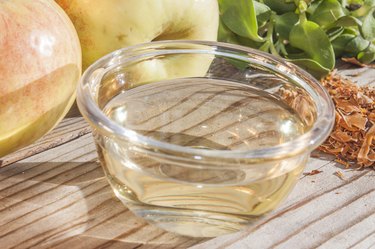
It may be easy to tell the difference between sweet, tangy apple cider versus apple cider vinegar (ACV). ACV is a perennial "health food" favorite, but comparing cider vinegar to apple cider vinegar gets a little murkier.
For the most part, "cider vinegar" and "apple cider vinegar" ($5.54 for 16 fl, Amazon.com) mean the same thing in common usage. However, fruit-flavored vinegar and individual branding practices add a few wrinkles to this rule of thumb.
Tip
In most cases, cider vinegar and apple cider vinegar refer to the same thing. However, you should always check the ingredients label to know what you're buying.
Video of the Day
What Is Apple Cider Vinegar?
There's a good chance you've heard of taking ACV with water or using it as part of a detox diet, but what is it, anyway?
Video of the Day
Vinegar itself is a fermented combination of acetic acid and water that can be made from the sugar or starch of many plant liquids, including grains, rice, potatoes and fruit, per the Harvard T.H. Chan School of Public Health.
Apple cider vinegar uses crushed apples as its base, lending the sour vinegar a brown hue and slightly sweeter taste. A 1 tablespoon serving of typical, off-the-shelf apple cider vinegar, diluted with water to 5 percent acidity, contains no calories, proteins, fats, carbs, sodium or nutrients, per the USDA.
However, some brands add ingredients, such as sweetening syrup, starch and flavoring, or use concentrated apple juice to add depth to their product. These variables, of course, change the nutritional makeup of the product.
For instance, one branded apple cider vinegar with apple juice concentrate, glucose-fructose syrup, modified starch and "natural flavor" contains 40 calories, 9 grams of carbohydrates, 10.1 milligrams of sodium and 8 grams of sugar in every tablespoon, according to the USDA.
Related Reading
What About Cider Vinegar?
Vinegar traces its roots back to 5000 BCE, as a cooking ingredient, medicine and preservative used in ancient Babylon., according to the Harvard School of Public Health. Naturally, that long history has given food manufacturers plenty of different ways to make vinegar a part of your diet.
Because vinegar can be made from a variety of fermented grain and fruit bases, vinegar can be sweetened with fruit juices and ciders, which may be dubbed "cider vinegar" (though in some cases, the fruit juice is added to an ACV base). Examples may include raspberry cider vinegar or strawberry cider vinegar, but vinegar products that have the word "cider" on their label without containing apple cider aren't too common.
Vinegar itself is a poor source of both calories and nutrition, but vinegar with various kinds of fruit, or non-apple types of cider added, can run the nutritional gamut. Still, products labeled as "cider vinegar" are largely just some variety of apple cider vinegar.
Related Reading
Vinegar, Nutrition and Evidence
Many people tout vinegar for its health benefits and promise to aid in weight loss, but available research isn't abundant. What's certain? Vinegar nor ACV is a cure-all.
As for the science to back up vinegar's potential, there are some findings. A May 2018 meta-analysis from the Journal of Evidence-Based Integrative Medicine suggests that the regular intake of vinegar may lead to a small reduction in glucose levels.
Another trial, published in the April 2009 issue of Bioscience, Biotechnology, and Biochemistry is among the most significant vinegar studies to date. It found that consuming 1 to 2 tablespoons of vinegar each day leads to modest weight loss and lower triglyceride levels after a few months, but the study only covered 175 participants with obesity.
As the Harvard School of Public health highlights, existing research does not back up vinegar as a treatment for digestion issues, coughs, chronic disease of the disinfecting of wounds.
Apple cider vinegar likely won't hurt your diet, but also "won't replace a healthy lifestyle," Edwin McDonald IV, MD, wrote for the University of Chicago in August 2018. "It may have some benefits to our bodies, but overall, we need more studies to truly understand the health benefits and side effects associated with ACV."
- Harvard T.H. Chan School of Public Health: "Vinegar"
- USDA FoodData Central: "Apple Cider Vinegar (Branded, 375344)"
- USDA FoodData Central: "Apple Cider Vinegar (Branded, 458453)"
- University of Chicago: UChicago Medicine: "Debunking the Health Benefits of Apple Cider Vinegar"
- Journal of Evidence-Based Integrative Medicine: "Diabetes Control: Is Vinegar a Promising Candidate to Help Achieve Targets?"
- Bioscience, Biotechnology, and Biochemistry: "Vinegar Intake Reduces Body Weight, Body Fat Mass, and Serum Triglyceride Levels in Obese Japanese Subjects"